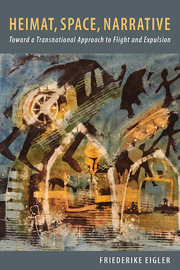Book contents
- Frontmatter
- Dedication
- Contents
- Acknowledgments
- Introduction: Geocritical Approaches to Place-Bound Belonging
- Part I Reassessing the Study of Heimat, Space, and Postwar Expulsion
- Part II Horst Bienek's Novels on Upper Silesia (1975–82)
- Part III Contemporary Novels
- Conclusion: “Lived Spaces” in Literary Narratives
- Filmography
- Works Cited
- Index
Introduction: Geocritical Approaches to Place-Bound Belonging
Published online by Cambridge University Press: 05 August 2014
- Frontmatter
- Dedication
- Contents
- Acknowledgments
- Introduction: Geocritical Approaches to Place-Bound Belonging
- Part I Reassessing the Study of Heimat, Space, and Postwar Expulsion
- Part II Horst Bienek's Novels on Upper Silesia (1975–82)
- Part III Contemporary Novels
- Conclusion: “Lived Spaces” in Literary Narratives
- Filmography
- Works Cited
- Index
Summary
Flight, expulsion, and forced relocation of different ethnic groups make up an intricate part of European history in the first half of the twentieth century. While the circumstances and consequences varied in each case, these phenomena taken together throw into relief the precarious state of the notion of a stable and secure home, homeland—or Heimat. Some of the most extreme examples of forced relocation in the twentieth century occurred as part of the “westward shift” of Poland at the end of the Second World War, which involved redrawing the borders of the Soviet Union, Poland, and Germany (as decided by the Allies at the conferences of Yalta and Potsdam); as a result approximately eight million ethnic Germans—as well as at least one million Poles and 500 thousand Ukrainians—had to flee or were expelled from the border regions and other Eastern territories.
The atrocities commited by Nazi Germany against Poles on the one hand and the massive and often violent expulsion of Germans on the other contributed to the fraught relationship between Poland and Germany after the Second World War. The notion of Heimat, and in particular of a lost Heimat, is thus a central concern when exploring the German-Polish relationship, particularly in its literary manifestations. Indeed, literature is a prominent arena in which these historical events and their human consequences have been examined.
- Type
- Chapter
- Information
- Heimat, Space, NarrativeToward a Transnational Approach to Flight and Expulsion, pp. 1 - 10Publisher: Boydell & BrewerPrint publication year: 2014



